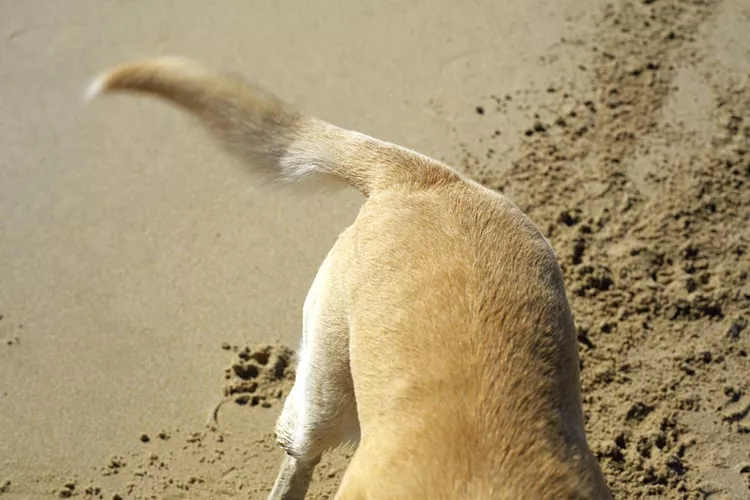Different Meanings of a Dog's Wagging Tail

A wagging tail is a form of dog communication. Dogs wag their tails to tell us something about how they're feeling, just as they do with other forms of body language. But do you know what canine tail wagging really means?
Why Dogs Wag Their Tails
Dogs wag their tail to communicate with humans and other animals. Often, it seems fairly obvious what the dog is trying to tell you when it wags its tail. Most people look at a dog with a wagging tail and assume it is happy. While this is usually true, there are times when a dog wags its tail just before it becomes aggressive. It is important that you pay attention to how the dog is holding its tail when it's wagging it. Where the tail is and the way a dog holds its body while it's wagging it can give you a clue about what it is trying to communicate. You should also pay attention to other signs in the dog's body language.
Happy Wagging
Is the dog's tail relaxed and moving back and forth? Is its body moving along with the wagging? If a dog is wagging its tail and the rest of its body seems relaxed or is moving along with the wagging, you are probably dealing with a happy, comfortable dog. Happy, relaxed tail wagging is usually accompanied by a happy facial expression. A happy dog usually has bright eyes, a relaxed open mouth, and possibly a gentle pant. Fast tail wagging with other happy signals usually means the dog is excited.
Alternative Reasons
Is the dog's tail high and moving in back and forth motion while the dog's body remains fairly erect and rigid? If a dog is holding its body erect and rigid while wagging its tail, it may be telling you that it's feeling territorial or uncomfortable with something that is going on around it. The tail may be low and wagging slowly, usually because the dog is hesitant about something. Or the dog's tail may be held high and moving back and forth, narrowly but rapidly. This discomfort can be a precursor to aggression. This is one reason people sometimes report that a dog was wagging its tail just before it bit someone. So, if you encounter a dog you don't know who is wagging its tail, check out what the rest of its body language is telling you before you approach. It's better to be safe than to get bitten by a dog.
Left and Right Tail Wagging
Does it matter which direction a dog's tail wags? One study shows it might matter when it comes to dog-to-dog communication. Researchers found that dogs had different emotional responses depending on whether another dog's tail was wagging to the left or right. Dogs observing another dog wag to the right seemed to become relaxed. Dogs watching another dog with a left tail wag exhibited signs of nervousness, stress, or anxiety. This study shines some light on the way dogs interact with one another.